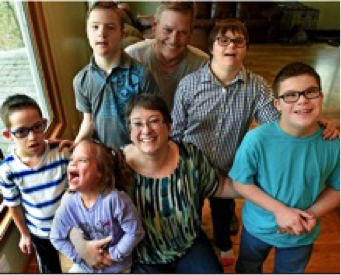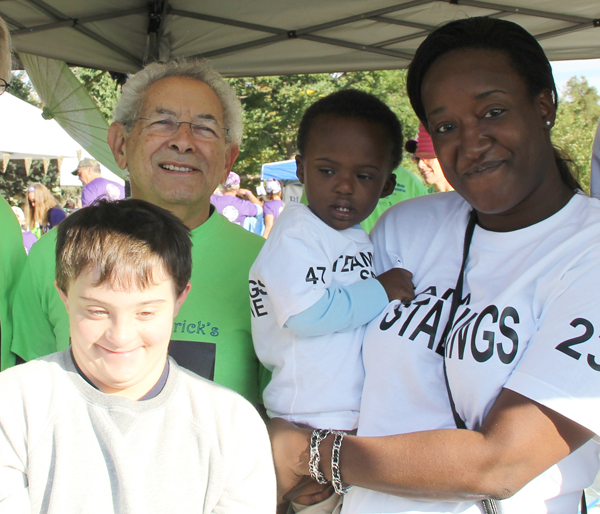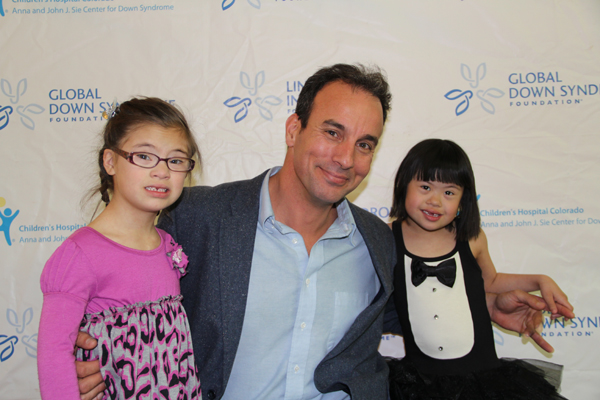Mom Raising 5 Kids with DS ‘Called to Motherhood’

Leah Spring and her family

Tom Blumenthal, Ph.D., upper left, molecular biologist

Joaquin Espinosa, Ph.D., cancer and molecular biologist
Leah Spring has five children with Down syndrome — and she’s fighting breast cancer. At the Linda Crnic Institute for Down Syndrome, researchers are studying how people with Down syndrome and their resistance to solid tumor cancers can help people like Leah.
Leah Spring, who lives in Eagan, Minnesota, has a big family. Her eight children range in age from 10 to 28 and comprise her “Garden of Eagan,” which is also, not coincidentally, the name of her blog.
Five of those kids also happen to have Down syndrome. Spring gave birth to her first, Angela, in 1996 and adopted her other four between 2010 and 2014 (she’s in the process of adopting a fifth) from Serbia, where only children with special needs qualify for international adoption.
“Down syndrome is normal to us,” Spring told The Associated Press. “If there’s a kid out there with Down syndrome who no one wants because they think they can’t handle Down syndrome, well, we can.”
While Spring, and all of her children, accept Down syndrome as a joyous diversity of ability, she’s had to deal with something much less joyful in recent months, a diagnosis of breast cancer.
The fight hasn’t been easy. She chose to treat her cancer aggressively with a double mastectomy, chemotherapy, surgery, and a five-year course of medication. Through it all, she told the news service, her children have given her the energy she needs to battle this insidious disease.
The Down Syndrome – Cancer Connection
Spring’s children might also be giving her much more.
People with Down syndrome have a significantly lower risk than the typical population of developing solid tumors that cause breast, colon, and other aggressive cancers. Tom Blumenthal, Ph.D., Executive Director of the Crnic Institute, and Joaquin Espinosa, Ph.D., Associate Professor in the Department of Molecular, Cellular, and Developmental Biology at the University of Colorado Boulder and Howard Hughes Medical Institute Early Career Scientist, are researching a number of theories to explain this anomaly. They are looking at how the “overexpression” of chromosome 21 — Down syndrome is caused by having three copies of chromosome 21 instead of two — appears to influence the suppression of solid tumor cancer, as well as how cancers respond to treatment.
For instance, the extra copy of chromosome 21 is known to cause deficiencies in cell division in people with Down syndrome, and scientists have theorized that stem cells required to produce tumors in individuals with Down syndrome may not be able to divide quickly enough to form a cancerous tumor. Another theory postulates that chromosome 21 contains one or more genes that naturally slow down tumor growth. For instance, there is a gene on chromosome 21 known to suppress growth of new blood vessels, and new blood vessels are needed for tumors to grow.
“So far, we do not understand why people with Down syndrome have a significantly decreased frequency of tumors,” Dr. Blumenthal said. “Understanding the elements that can prevent cancer would be a tremendous contribution individuals with Down syndrome could make to the world.”
Join Global Down Syndrome Foundation today to read more about research on Down syndrome and cancer, including how researchers are working to uncover why children with Down syndrome are at a higher risk of leukemia, in the latest issue of Down Syndrome World magazine.
Recent Posts
- New Study Reveals Widespread Liver Dysfunction in Down Syndrome, Suggests Link to Diet
- 2026 Global Down Syndrome Foundation Events
- GLOBAL Hosts National Experts in Denver to Finalize Recommendations for the Second Edition of the GLOBAL Medical Care Guidelines for Adults with Down Syndrome
- Happy Thanksgiving from Our GLOBAL Team: Thank You for Being Part of Our Family
- “They Came to Us!” Nebraska Mom Shares Family’s Research Experience


 Experience our inspirational and groundbreaking videos and photos. Our children and self-advocates are beautiful AND brilliant!
Experience our inspirational and groundbreaking videos and photos. Our children and self-advocates are beautiful AND brilliant! Make sure your local Representatives are on the Congressional Down Syndrome Task Force.
Make sure your local Representatives are on the Congressional Down Syndrome Task Force.